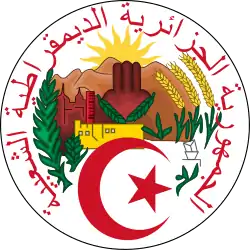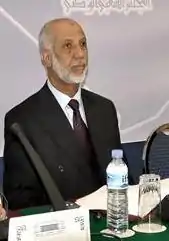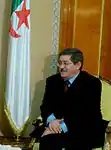2007 Algerian legislative election
Legislative elections were held in Algeria on 17 May 2007.[1] 24 political parties and around 100 independent lists with a total of more than 12,000 candidates competed for the 389 seats in the National People's Assembly. While most Algerians voted on May 17, immigrants from Algeria to other countries (especially France) and Algerians living in the Sahara (i.e. Southern Algeria) and other nomads and semi-nomads voted on May 16 due to the distance from Algiers, the country's capital.
| ||||||||||||||||||||||||||||
All 389 seats to the People's National Assembly 195 seats were needed for a majority | ||||||||||||||||||||||||||||
|---|---|---|---|---|---|---|---|---|---|---|---|---|---|---|---|---|---|---|---|---|---|---|---|---|---|---|---|---|
| ||||||||||||||||||||||||||||
| ||||||||||||||||||||||||||||
 |
|---|
| This article is part of a series on the politics and government of Algeria |
|
|
At 35% of the 18.7 million[2] voters, the turnout was the lowest in Algerian history.[3][4] Several political organisations, notably the Socialist Forces Front,[5] the ex-communist Democratic and Social Movement,[6] leading members of the former Islamic Salvation Front (Abbassi Madani[7] and Ali Belhadj), the main faction of the split Islamist Islah Party,[8] and the newly formed organisation Rachad,[9] had called on their supporters to boycott these elections. These political groups claimed that the elections were consistently rigged by the government, and that participation merely lent a fundamentally corrupt process undeserved legitimacy.
The only notable remaining armed group in Algeria, the Al-Qaeda Organization in the Islamic Maghreb, issued a video calling participation in the elections "a great sin", adding its voice to the boycott calls. Tight security measures were implemented to protect the elections; however, two bombs exploded in Constantine the day before the election, killing a police officer and wounding five others.[10]
Said Bouchair, the head of the national commission of legislative election control, initially reported that ballot boxes in some areas were being stuffed with FLN ballots, that observers were being prevented from attending, and that some areas refused to open ballot boxes before voting began to allow observers to see whether they were empty or not. He then retracted his statement and apologised.[11] About 15% of ballots were spoiled.
The Constitutional Council confirmed the results of the election, with slight changes to the voter turn-out rate and number of seats won by some parties, on May 21.[12] It rejected appeals regarding the election on May 30.[13]
Results
Women won 31 seats, which was an increase of eight.[14]
References
- Q&A: Algerian election BBC News, 15 May 2007
- Low turnout in Algeria elections BBC News, 18 May 2007
- Ruling bloc wins Algeria vote Al-Jazeera, 18 May 2007
- Algeria experiences lowest-ever voter turnout Mail & Guardian Online, 18 May 2007
- Le FFS a l’honneur, la liberté et le privilège d’annoncer sa décision de non participation au prochain scrutin législatif Archived 2007-05-16 at the Wayback Machine, FFS, 10 March 2007
- La Tribune, 15 May 2007
- Algerians play down calls to boycott legislative elections, 16 May 2007
- El Islah release, 14 May 2007
- Regarding the “Elections” of 17 May 2007, Rachad, 15 May 2007
- Bombings on eve of Algeria election, Al Jazeera English, 16 May 2007.
- Bouchair complains to president then retracted and apologized Archived 2007-09-28 at the Wayback Machine, El Khabar 19 May 2007, Algérie : Bouchaïr crie à la fraude puis... se rétracte Archived 2007-09-27 at the Wayback Machine, El Annabi 19 May 2007
- "Mini-modification des résultats des législatives par le Conseil constitutionnel", Xinhua (Jeuneafrique.com), May 22, 2007 (in French).
- "Le Conseil constitutionnel valide les législatives du 17 mai", AFP (Jeuneafrique.com), May 30, 2007 (in French).
- APN - Listes des depute de la sixieme legislature 2007-2012 Archived 2007-10-26 at the Wayback Machine Assemblée populaire nationale, 30 May 2007

